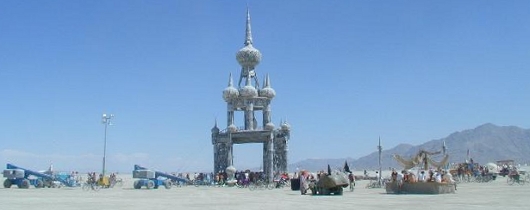Sisyphus and Warcraft by Mark Stone
January 2011. One of the surprise gaming hits of 2010 was Minecraft. In some ways its an astonishingly low tech game, with minimal resource management, no victory conditions, no quests. You get some blocks. And you build something with them. Anything. In multiplayer, you can wander around and see what other people have built.
And people have built some amazing constructions in Minecraft. There's a whole picture album on Flikr, but here are a couple of representative examples:


Nor is it all landscapes. One enthusiastic participant has created a scale model of the starship Enterprise.
This work is time consuming and tedious. Minecraft, after all, is not a multi-million dollar production rivaling a Hollywood film in terms of scope, cost, and resources. It is an indie game that is one person's passion and vision (thank you, Markus Persson). So why are people so obsessed with Minecraft?
To understand this, you have to understand what is so deeply wrong with Minecraft's antithesis, World of Warcraft (WoW, for short).
WoW is the most successful entrant in the genre known as MMORPG; let's focus for a moment on the RPG part. WoW and the rest are supposed to be inspired by the original RPG, Dungeons and Dragons. I've played Dungeons and Dragons since its inception, and I've always loved the interactive fiction elements of the game. Players and dungeon master collaborate to create a heroic narrative where no one quite knows what the outcome will be, nor what path the narrative will follow to get there. Since the dungeon master is all powerful, what makes this collaboaration work is (a) the knowledge by the players that the world they adventure in is persistent from adventure to adventure, and (b) the concession by the dungeon master that actions taken by the players change the world permanently.
A persistent world that changes continually but permanently: think how essential those elements are to fiction of the fantasy or sci fi genre. "The Lord of the Rings" means nothing if the Dark Tower rebuilds itself and Sauron simply rises again. "Dune" means nothing if Paul's consumption of melange is not a permanent and irrevocable choice. In interactive fiction, the players meet many chances to make heroic choices, but each heroic act is singular and unrepeatable.
WoW completely misses this essential element of the Dungeons and Dragons. The hero in WoW is more like the Greek Sisyphus, confronting the same quests that are never truly done, but instead stand ready to be repeated for all eternity. The idea that any adventure party in WoW can come along and slay the same monster, pursue the same quest as any other makes a Sisyphan mockery of the idea of an RPG. In WoW the world is not persistent, and no act permanently changes the world.
A person I've never met commented on a friend's FaceBook post about her first experience playing Dungeons and Dragons, saying, "Try World of Warcraft. Its much more fun; no imagination required."
We turn to fiction to engage the imagination and fuel our creativity. Interactive fiction can do this in powerful and unique ways, because it is collaborative in a way that reading a novel never can be. Imagination is the whole point.
Which brings us back to Minecraft. The game may be primitive. The actions required to build anything may seem clumsy at times, and often tedious. But in Minecraft, players are not just adventuring in a world. They are creating it. Everything they build, every action they take permanently alters the world in which they game, and that world persists from session to session.
Minecraft is collaborative, interactive, and deeply imaginative. Thus it is much more a virtual reality than anything WoW could ever hope to be.


